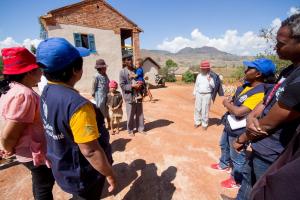Cameroon's community leaders drive demand for COVID-19 vaccines
Yaoundé – Local leaders, working with over 2300 community mobilizers and 1450 vaccination teams, were crucial to the success of a rapid COVID-19 vaccination drive that saw 52 000 people vaccinated across Cameroon in just five days in July.
Community leader Jean Calvin Nama-Ntse works to build trust in COVID-19 vaccines in the Nkomassia and Nkolbisson communities in the capital Yaoundé. A life-long community member, he is a traditional Chief, Chairman of the Nkolbisson Health District and Chairman of the Management Committee at Nkolbisson’s Integrated Health Centre.
Tell us about the communities you work with?
Here in northern Yaoundé we have both rural and urban areas. We have more than 80 000 people that come from across Cameroon and other African countries like Mali, the Republic of the Congo, Burundi and Central African Republic. With a mix of different religions, we respect the right to worship freely. We’re not a rich community and most people live off small businesses or informal trading.
What are the biggest challenges in fighting COVID-19 and demand for vaccines?
Our population is quite young and although we are generally well informed, not everyone is aware of all the risks from COVID-19, so not everyone sticks to the prevention measures or are keen to get vaccinated.
Despite the flood of information on COVID-19, there is still fear, doubt and scepticism around vaccination. Rumours and misinformation spreading on social media and dreamed up by certain people sow doubt and reluctance to get vaccinated, which leaves people at greater risk.
What are the key lessons from your work?
In my experience, people who have had the disease or seen others suffer with it are far more aware of the risks and are much keener to get vaccinated. If we use more of these people as educators I’m sure they will raise the uptake of vaccines.
Also, when leaders get vaccinated in public other people follow, especially big media personalities, artists and religious leaders. As a community leader I made a point of getting vaccinated in public.
Putting vaccination points in public spaces like markets, at crossroads or near churches also builds confidence in the community and leads to more people coming for vaccination.
Tell us about the support you received from WHO and partners?
I joined workshops on how to mobilize communities and to advocate and access more resources for immunization campaigns. These were run by the Ministry of Public Health, with
the World Health Organization (WHO), the United Nations Children’s Fund (UNICEF) and the German Agency for International Cooperation (GIZ).
I also joined City Council meetings led by District Health Officers. These help us raise demand for COVID-19 vaccines in our communities. About 300 people have been covered by these trainings so far and more are planned for this year.
From these we learned to work more closely in our communities, giving talks on COVID-19 and the need for vaccination in local markets and public spaces. We’ve visited families to speak intimately with them. We’ve given talks to local associations and worked with local media. We’ve also worked with religious leaders and local government authorities on spreading prevention messages as they are trusted and people listen to them.
These days I only use information from trustworthy sources, including from the government, WHO and of course from my own life experience.



